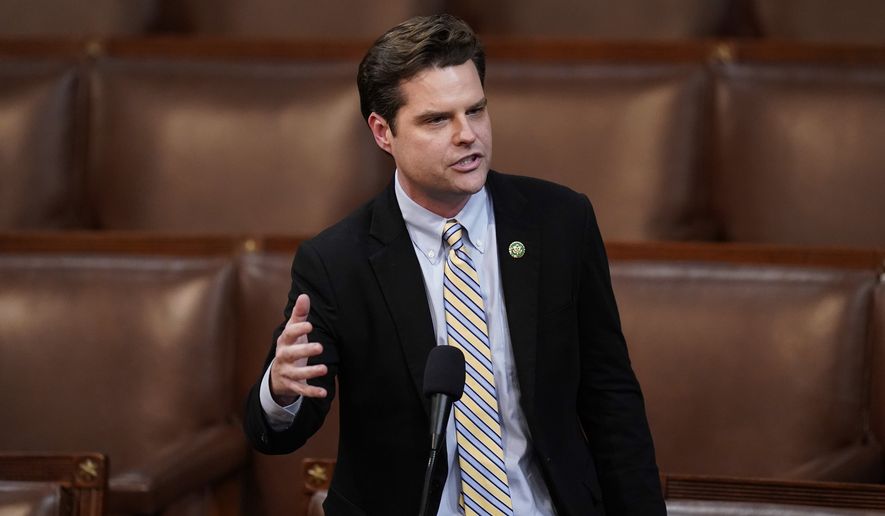The leaders of the Republican rebellion who delayed the installation of House Speaker Kevin McCarthy at the opening of the 118th Congress are united behind him just three months later.
These staunch conservatives told The Washington Times that they are pleased with Mr. McCarthy’s leadership. They say the California Republican earned their respect by keeping promises that won their begrudging support to elect him speaker after a grueling 15 rounds of voting in the House chamber in January.
“He’s doing a good job,” said Rep. Matt Gaetz of Florida, who was at the forefront of the blockade. “I feel pretty good about the good faith that’s been shown.”
Mr. Gaetz was a die-hard opponent of Mr. McCarthy until the band of 20 holdouts in the Republican Conference won concessions for rules changes, including procedures that help lawmakers attack government spending.
Mr. McCarthy also doled out plum committee assignments to some of the rebels and their allies.
“We got the four members on Appropriations he promised. We got the three members of Rules he promised. We got the members on other committees that were discussed,” said Mr. Gaetz, who voted “present” in the final round of the speaker’s election to lower the tally threshold and allow Mr. McCarthy to win.
Rep. Matthew Rosendale of Montana, another prominent holdout, also voted “present” in the 15th round. He recently said Mr. McCarthy is “doing well” leading the House.
“I think that we put tools in his hand that made him more effective with the rule changes, and I think he’s taken advantage of those tools that we’ve given him,” Mr. Rosendale said.
Rep. Bob Good of Virginia, another rebel leader who eventually relented with a “present” vote, said Mr. McCarthy is “off to a good start.”
“He’s doing and saying the right things. I think the conference is largely united on our goals. And I think he’s going to move forward the critical border bill that we need,” he told The Times. “I think he’s going to lead us on the battle to cut our spending to create critical pieces in the next few weeks.”
The new rules, crafted by some of the most fiscally conservative House lawmakers, make it easier to pass bills to reduce federal spending and more difficult to raise the nation’s borrowing limit or increase tax rates.
Republicans have been surprisingly united and have scored wins during the early days of Mr. McCarthy’s speakership, including President Biden’s signature on measures that overturned the District of Columbia’s crime bill. On Monday, Mr. Biden signed a
Republican-led bill to formally end the COVID-19 public health emergency.
Mr. McCarthy had long sought the speakership. After John A. Boehner of Ohio retired amid a conservative rebellion in 2015, Mr. McCarthy dropped out of the Republican speaker’s race against Rep. Paul D. Ryan of Wisconsin.
This Congress, Mr. McCarthy wanted to avoid some of the pitfalls that Mr. Boehner and Mr. Ryan faced, including infighting with the House Freedom Caucus. Yet in the deal-making to seize the speaker’s gavel, Mr. McCarthy gave in to the rebels’ demand to restore one of the most crippling rules: a centuries-old provision allowing one lawmaker to bring up a vote to eject the House speaker.
The rule hastened Mr. Boehner’s retirement. House Speaker Nancy Pelosi, California Democrat, eliminated the rule on her watch.
The Republican rebels insisted that restoring the ability of one member to call a vote to “vacate the chair,” as the resolution is known in Congress, would ensure that Mr. McCarthy could be held accountable, specifically regarding spending.
Other rules changes have:
• Restricted increases in direct spending and blocked the House from automatically raising the nation’s borrowing limit.
• Slowed the passage of legislation by requiring a firm 72 hours for lawmakers to consider bills before voting.
• Required a three-fifths vote in the House to raise tax rates.
• Ended the proxy voting and remote committee hearings started by Democrats at the beginning of the COVID-19 pandemic.
Rep. Scott Perry, Pennsylvania Republican and House Freedom Caucus chairman, voted for Mr. McCarthy in the 12th ballot round. Mr. Perry noted that members from the conservative group had made a difference since Mr. McCarthy was elected.
“We just signed another bill. The first few bills signed by the president are from Freedom Caucus guys. That is pretty awesome. I would say [the speaker] is doing pretty darn good.”
Rep. Paul Gosar of Arizona, a holdout who authored the bill to end the COVID-19 national emergency, credited Mr. McCarthy for helping push the legislation across the finish line.
“He played a pivotal part in getting that done and, so that should tell you,” he said.
Democrats have accused Mr. McCarthy of being a puppet of a small faction of conservative lawmakers.
Rep. James McGovern of Massachusetts, the top Democrat on the House Rules Committee, said the rules package “was written by a small fringe group” in the Republican Conference. He predicted that the new spending provisions would lead to gridlock and a government shutdown.
“People do not want government shutdowns,” Mr. McGovern said. “People do not want to see us default on our financial obligations. People want us to get stuff done and keep the lights on.”
• Kerry Picket can be reached at kpicket@washingtontimes.com.




Please read our comment policy before commenting.